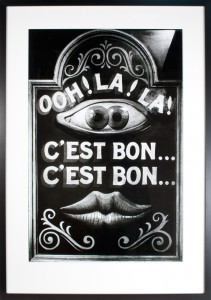I’ve been in Paris half a year now. I should know everything. Then why is my French getting worse?
When I asked that question to my French conversation group, they said, “It’s not. ”
“Then why does my friend (whom I’ll call G) correct me ten times as much as she used to? She doesn’t correct my husband, and I thought my French was better than his.”
“It’s a sign of friendship,” they said. “Now she’s comfortable enough to point out your flaws.” I’d always heard that the French take a different view of friendship than Americans do. It takes a long time to become intimate, but once you’re in someone’s small inner circle, it’s very meaningful. In America, we tend to have a bigger circle, with more superficial friendships.
G is one of the warmest, friendliest, most generous people I’ve ever met, so I know she metes out her lessons from the goodness of her heart.
She corrects my daughter, too. Ella’s favorite snack to order at the bakery is a bread shaped like a mouse, which is called “une souris.” Ella asked for “un souris” and the woman behind the counter gave her a cookie (un cookie) instead. The woman seemed confused when Ella said it wasn’t what she ordered.
G straightened things out and explained to Ella and me after we’d left: “It’s very important to get the gender correct or people won’t understand you. She heard “un” and “ee” so she assumed you asked for a cookie. People listen to the beginning and the end but sometimes miss the middle.”
That explains a lot.
The next time G corrected Ella’s pronunciation of the vowels in “souris.” “Diphthongs are hard for Americans to say,” she said, and modeled the complex nasal gymnastics for Ella. “It’s important for her to get this right,” G said. “No offense, Sharon, but it’s too late for you.”
At lunch G told me to place my bread on the table to the left of my plate. “Everyone will know you’re American if they see you put the bread on the plate,” she said. I had never heard this before. So every time I’d sat down to a meal before I’d been doing it wrong.
But my funniest faux pas was revealed at pick-up the other day. I don’t know how many times I said the phrase “c’est bon” to the other parents as we waited for our children to be released. I was talking about books and films and museums. Elevated stuff. I’d been speaking this way at lunch earlier, with a French writer I really wanted to impress. I was on a roll. Until G stopped me. “Bon is only for food,” she said. “Everything else is bien.”
Apparently, when I thought I was expressing refined opinions about life and art, all I’d said was “how tasty.” Delicious. Yum.
But it gets worse. When I shared this anecdote with my French conversation group, they laughed and said. “There’s one other thing people will think you mean when you use the phrase “c’est bon.”
Oh good. Maybe I hadn’t made a complete fool of myself with that French writer at lunch.
“We also say that when we’re talking about sex.”
So I’d been saying all day (maybe all six months I’ve been in Paris) that everything is tasty and sexy.
Well, it is. Isn’t it?

